The Brexit Party may have lost the Peterborough by-election but Farage isn’t going away
Labour’s triumph can’t disguise the fact that Brexit – and its most prominent advocate – has brought chaos and conflict to British politics, says Sean O’Grady

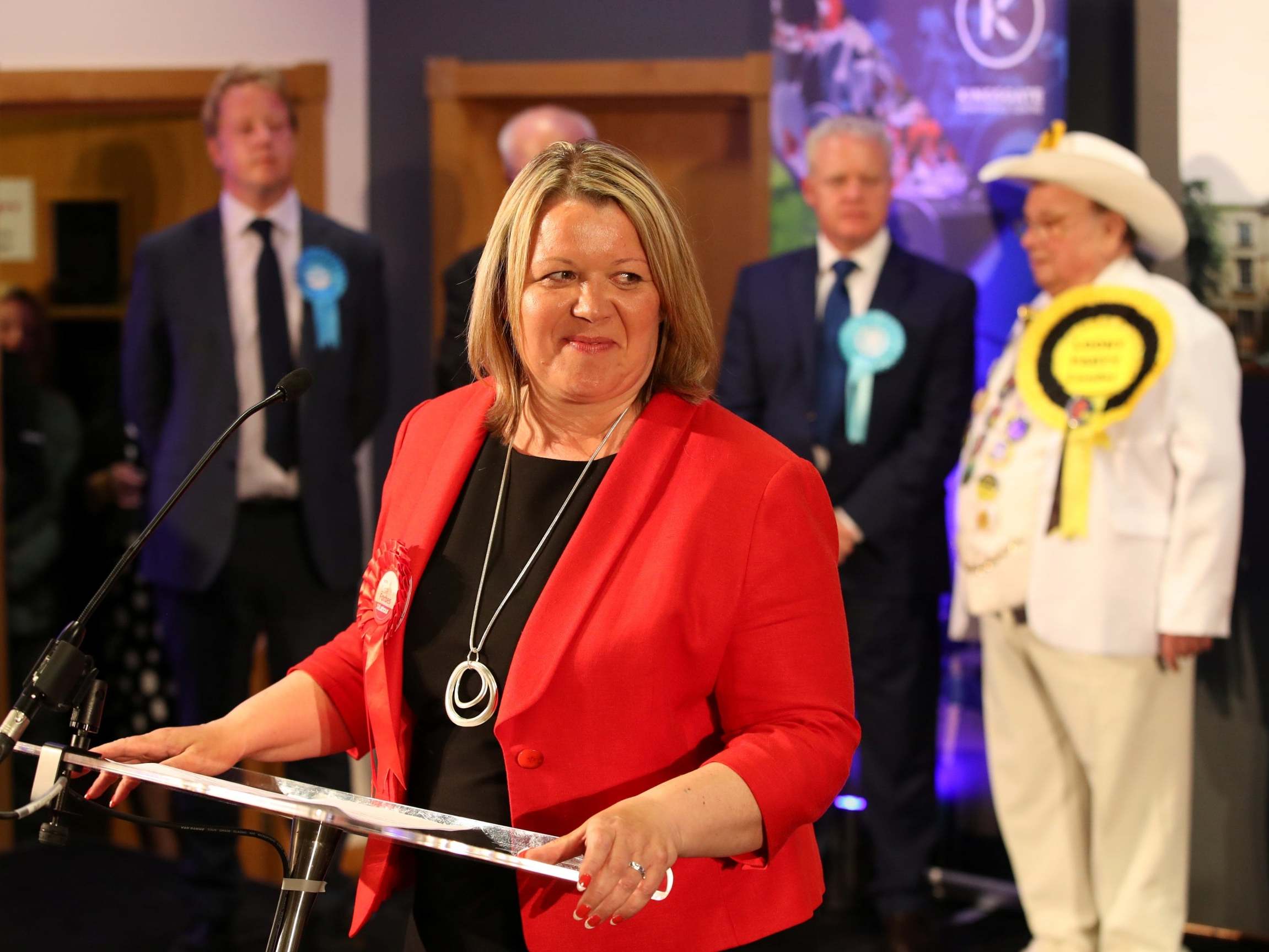
The Brexit Party is on a roll. Plainly. The near miss in Peterborough doesn’t alter that. In fact, it confirms it. They came from nowhere to grab a quarter of the vote, and within 600 votes or so of a truly historic breakthrough. It’s true that the vote share is down on the European election level in the city of 38.1 per cent, but that is to be expected – people habitually vote in different ways for councils, the European parliament, and Westminster.
The central fact is that the Labour and Conservative shares of the vote collapsed – down by 17.2 and 25.5 percentage points respectively, compared to the 2017 general election. A Con-Lab marginal is now a BP-Lab marginal. This is entirely consistent with the recent European elections – which the Brexit Party actually won, and with current national polls; and is also entirely consistent with Nigel Farage, once again, having a dramatic effect on British politics.
The one thing the Brexit Party seems to have lacked locally in Peterborough is “data” – canvass returns and a database of the electorate. A new party cannot know where its supporters live and will always be less able to “get the vote out”. That is where Labour scored.
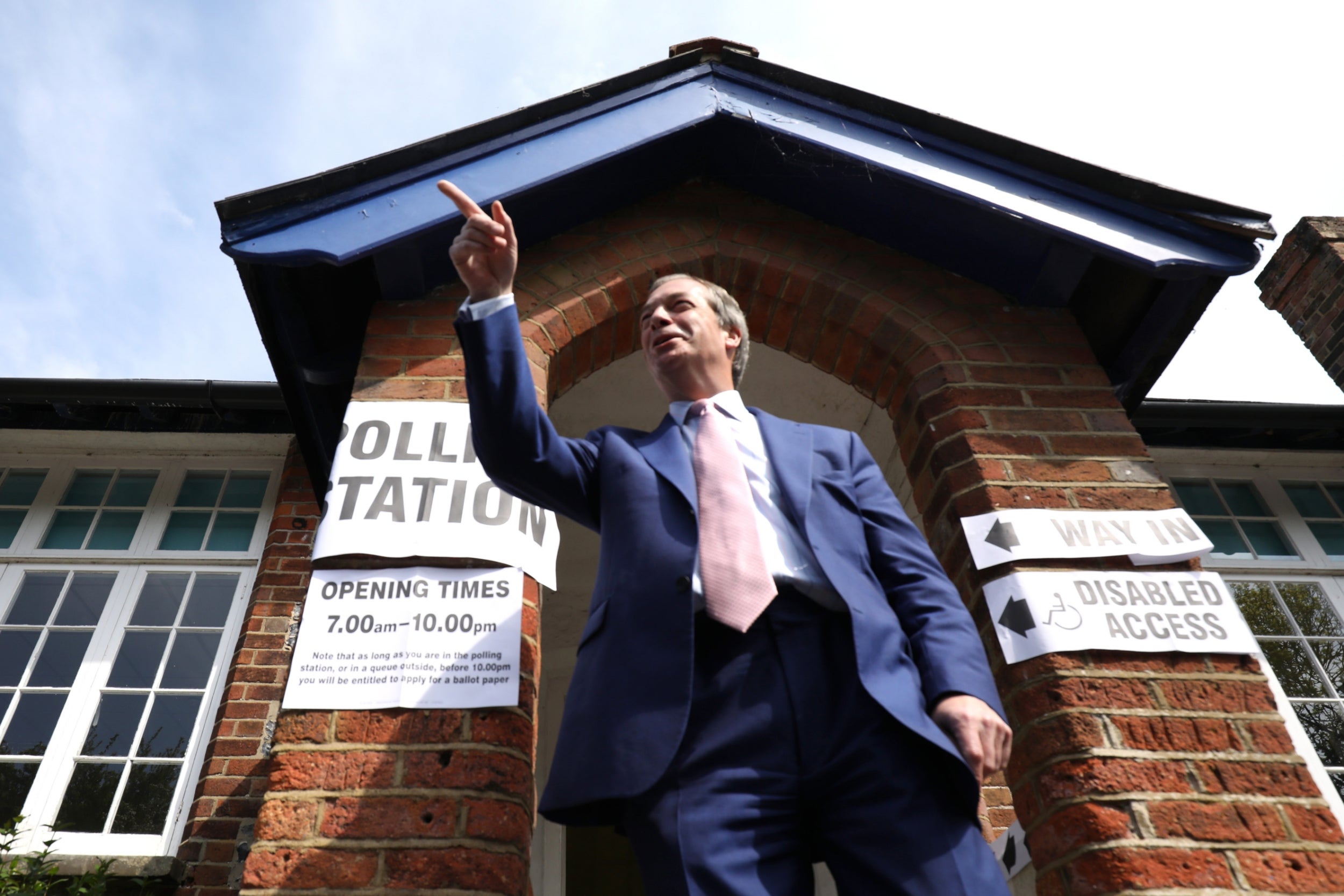
Against that weak point, the Brexit Party can console itself that it possesses one of the most precious assets in electoral politics: momentum. Not as much as if they had taken the seat, but still. They have, to use the vernacular, put the wind up the Conservative Party and its leadership election. Boris Johnson predicts extinction for the Tories unless they match the Brexit Party’s militant stance, and the UK leaves the EU on 31 October, deal or no deal. The Peterborough by-election re-enforces Johnson’s appeal to the Tory grassroots, many of whom defected to the Brexit Party.
So Peterborough cannot be shrugged off as some mere protest vote. It matters, and it shows how British politics is continuing its gradual, uneven, but nonetheless inexorable re-alignment.
Driven by Brexit, and the Brexit Party, our system is mutating before our eyes. It is, first, evolving into a four-party system, with two parties representing the clear polar alternatives on Leave (the Brexit Party) and Remain (the Liberal Democrats). The Conservatives and, to a lesser degree, Labour are losing out to these two new forces, shrivelling visibly.
Even in Peterborough, hardly natural territory for the Lib Dems, Vince Cable’s party trebled its vote to around 12 per cent – a significant swing. In more promising constituencies they should start to regain the seats lost in 2015, and more. More dramatically, as in the European elections the Conservative vote evaporated. This was, remember, once the seat of a Conservative Party chairman, Brian Mawhinney, and held by the Tories on and off for decades. Now they did well to come third.
Neither of our two great historic governing parties is just going to disappear overnight or even over a parliament – but the trends are clear enough. Labour and the Tories are undergoing a historic squeeze, and, in the meantime, the century-old British Lab/Con party tradition and the first-past-the-post electoral system are the next parts of the constitution to crack.
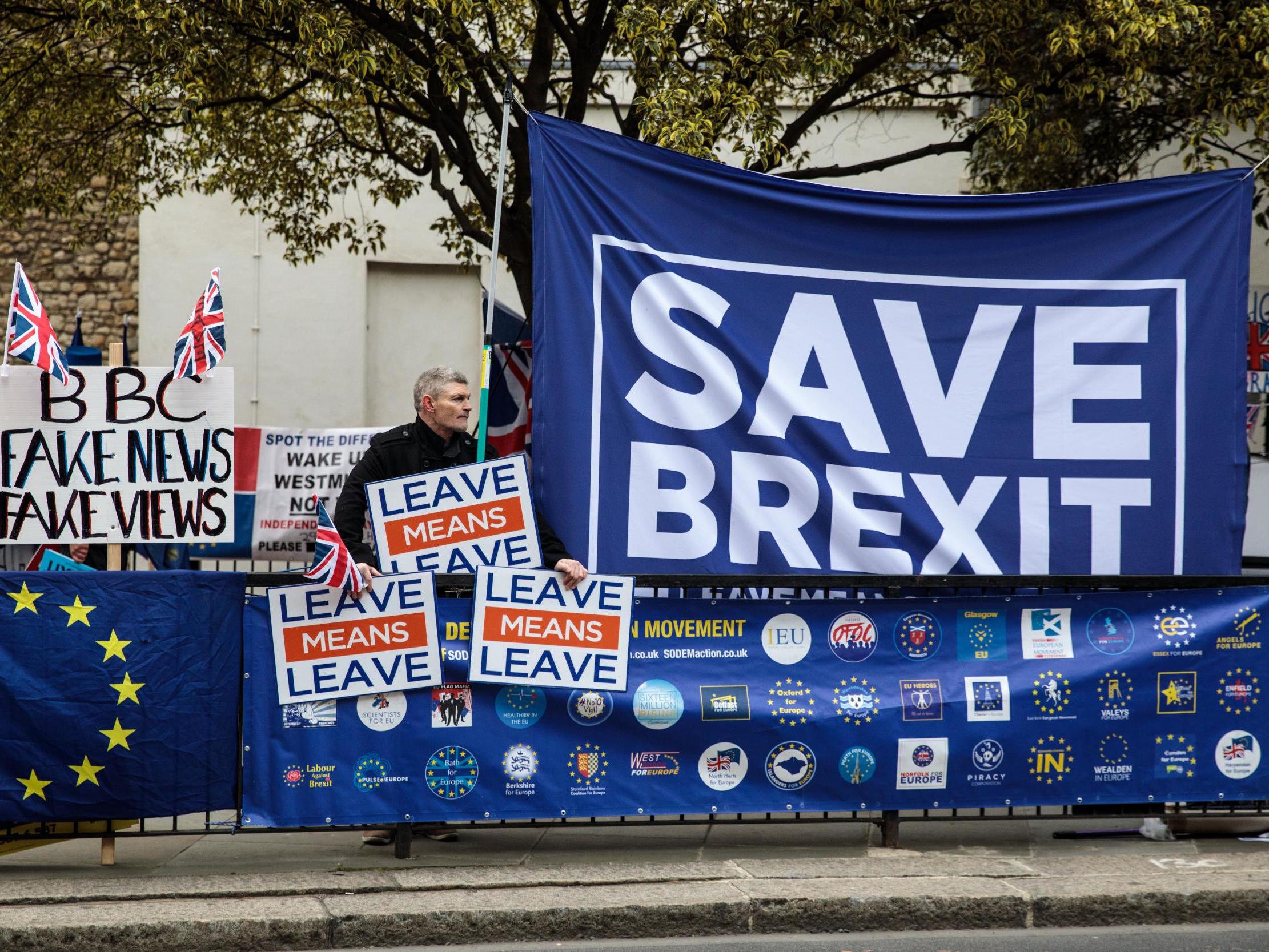
All of this could mean a near random outcome at the next general election. If, say the Brexit Party, the SNP and the Liberal Democrats take votes disproportionately from the Conservatives, and Labour support holds up a bit better, then the net effect could be to generate a Labour landslide, even if Jeremy Corbyn was only on, say, 35 per cent of the vote. (After all, Labour managed to hang on in Peterborough with a measly 31 per cent of the vote.)
The last time the UK party system convulsed itself was in the 1920s, when Ireland left the union, and Labour displaced the old Liberal Party. In those years general elections started to return freakish, accidental results – not just hung parliaments, but wildly disproportionate representations.
Alternatively, the Brexit Party could make such a breakthrough that it becomes the kingmaker in a hung parliament, or even the senior partner in some Brexit-Conservative party arrangement or coalition. Maybe that would also include the Democratic Unionists from Northern Ireland again. That, as it happens, was the hope that Farage nursed before the 2015 general election, when Ukip was seemingly as potent a threat as the Brexit Party is today (though of course events turned out rather differently).
So the Brexit Party has 29 MEPs, success at Westminster, 100,000 registered supporters, plenty of funds, and has already changed the Tory leadership. All this, as Farage never fails to remind the world, from a party that didn’t exist a couple months ago.
Why is the Brexit Party doing so well, and thus driving the re-alignment of British politics? How has the very existence of the Conservative Party fallen into jeopardy?
The clue, of course, is the name. Brexit remains the transcendent political issue of our times, bitterly divisive and paralysing economic and political life. Obviously the Brexit Party, headed by a man who is synonymous with the cause, benefits from this salience. It has no manifesto, and one policy – Brexit. And, like Humpty Dumpty and words, Brexit means whatever Nigel chooses it to mean.
Leavers, many of them at least, are disillusioned by their failure to deliver on Brexit, even though they may agree with the Tories on some issues
Instead of the left-right divide that has usually defined party loyalties and voting patterns, a Brexit-Remain divide is redefining the shape of political life. Behind that, and much of the bitterness and division we are experiencing, is a kind of culture war: gammon v millennials is the shorthand for the intergenerational tension. Liberal, educated, younger Britain, especially in London and Scotland and the wealthier parts of the country, is increasingly Remain, though that vote is fragmented between the Liberal Democrats, Greens, the remnants of Change UK and the Scottish and Welsh nationalists.
Against them is the Brexit Party, which has swept up almost the entire Eurosceptic vote, with the rump of Ukip adding a fraction more. You’ll have noticed the two main parties don’t fit well into this structure. That’s because they don’t. Leavers, many of them at least, are disillusioned by their failure to deliver on Brexit, even though they may agree with the Tories on some issues.
Looked at from the other end of the telescope, the Conservatives’ support, in terms of the views of those voting for the party are surprisingly evenly divided between Leave and Remain. If the Tories are a vaguely “soft Brexit” party, with Theresa May’s deal representing their policy thus far, then it is not a pitch that resonates with many voters at all. Views on Brexit are polarising and hardening around the two extremes – No Deal and No Brexit, and this is slowly dragging the political parties with it.

Support for Ukip in 2015 and for Leave in 2016 and for the Brexit Party now in 2019 show familiar patterns. Ukip/Leave/the Brexit Party were/are particularly popular with older people and those with few or no formal educational qualifications, while younger people and graduates tended to shun Ukip and vote Remain, Labour (2017) and Lib Dem/Green/SNP etc (2017 and 2019). Leave/Brexit Party supporters are more likely to be social conservative, and less likely to favour free trade and globalisation.
Brexiteers are obviously more concerned about immigration and “sovereignty” than Remainers, and have been hit harder by austerity. They were and are looking for a party that voices their concerns, and in Farage’s various outfits – in Ukip, Leave.EU and now the Brexit Party, they have found it. Notwithstanding the nominal “hold” of the Peterborough seat, Labour is now suffering from its “constructive ambiguity” on Brexit, stressing class solidarity as the panacea to it, and fudging on the second referendum. It seems that rather than cleverly attracting both Remain and Leave voters – as arguably it did in the 2017 snap general election – it is now alienating both groups. The Peterborough result camouflages but does not erase that fact.
Labour seems to be better able to retain some loyal support, a “core” that is larger than the Tories. Unlike the Tories with the Brexit Party, Labour is not being challenged by a single “Remain Party” – but the Liberal Democrats are emerging as the pre-eminent player among those occupying that space, that is in England. In Scotland and Wales, the SNP and Plaid tend to attract the Remain vote (and it is stronger in Scotland than Wales). The struggle in Labour is to turn it into the Remain Party before it is too late.
In due course then, it is possible to imagine British politics realigning with the Brexit Party and the Liberal Democrats gradually supplanting the Conservatives and Labour. Those two historic old parties wouldn’t just disappear or go quietly into that good night; but the forces unleashed by the 2016 Referendum will push them way back into their geographical and demographic heartlands, rendering them junior players. In both cases, in varying proportions, their working class/northern/older wing will be chewed off by Farage, and their middle-class/southern/younger one by the Lib Dems, nationalists and Greens.
Have we not been here before though?

Back in 2015 Nigel Farage led a party called Ukip. It, too, won the European elections, in 2014, was doing well in the polls and in by-elections, and seemed set to become a significant force in Westminster. Of course what then neutralised that threat was David Cameron’s promise of an In/Out referendum on the EU – Farage and Ukip’s central demand. That, prompted and driven by the rise of Ukip and panicky Tory MPs, blunted the Farage attack – but it also delivered Farage his strategic goal. In that sense, Farage really won the 2015 general election anyway.
Now of course, Farage is able to cry “betrayal” and re-energise the forces he did so much to create. Indeed, it is difficult to imagine the Brexit Party being the phenomenon it is today, were it not for the Farage Effect. After all, before Farage “donned khaki” as he puts it and returned to full time frontline politics, Ukip was still in existence, still arguing for a hard Brexit, and getting out of the EU as soon as possible.
The way he dealt with the furore over Ann Widdecombe’s remarks about how science ‘could produce an answer’ to homosexuality was a master class in spin
And getting nowhere, utterly failing to mobilise and convert the 52 per cent Leave won in that 2016 referendum into a reliable electoral base. After the departure of Farage as its leader in 2016, considering that his life’s work in getting Britain out of Europe was about done, the party went through a series of disasters – brawls between its MEPs as succession of forgettable and ineffective leaders (remember Paul Nuttall?), all culminating in the recruitment of Tommy Robinson as an “adviser” to its last leader, Gerard Batten.
It was Batten who decided to call Islam “a death cult” and nominate the absurd and obnoxious so-called Sargon of Akad (Carl Benjamin) and Count Dunkula (Mark Meechan) as candidates for the Euro elections. It was not an election-winning strategy. The party is all but extinct, has no MEPs and Batten has stood down as leader. In fact Farage was happy to help bury his old party. He called Ukip “the new BNP”, contrasting it recently with his new party, which was to be “deeply intolerant of intolerance”.
Contrast Batten with Farage. Although he constantly disparages “professional politicians”, Farage, an MEP since 1999, is a spectacularly good one himself, probably the best at work today. Witness just a couple of recent examples. The way he dealt with the furore over Ann Widdecombe’s remarks about how science “could produce an answer” to homosexuality was a master class in spin.

He turned his batty new MEP from being the homophobe she was accused of being into a martyr for free speech, an ally of the Pope and a stout defender of the Muslim community. No apologies; nor a reprimand; in fact not even a disagreement with her. He said that “many many” Muslims had more extreme views on homosexuality than Widdecombe, an irrelevant point, not necessarily truthful (where’s the evidence?), but sufficient to shut his questioners up.
Or take his combative win over Andrew Marr a few weeks ago. When Marr started, legitimately, to throw back what Farage has said in the past about immigration and the NHS, Farage just went on the offensive, played the BBC bias card, and got away with it. In a tight corner he sparked a row and claimed (on Twitter): “We are not just fighting the political class, but the BBC too.” That was what all the news stories were about the next day. Job done.
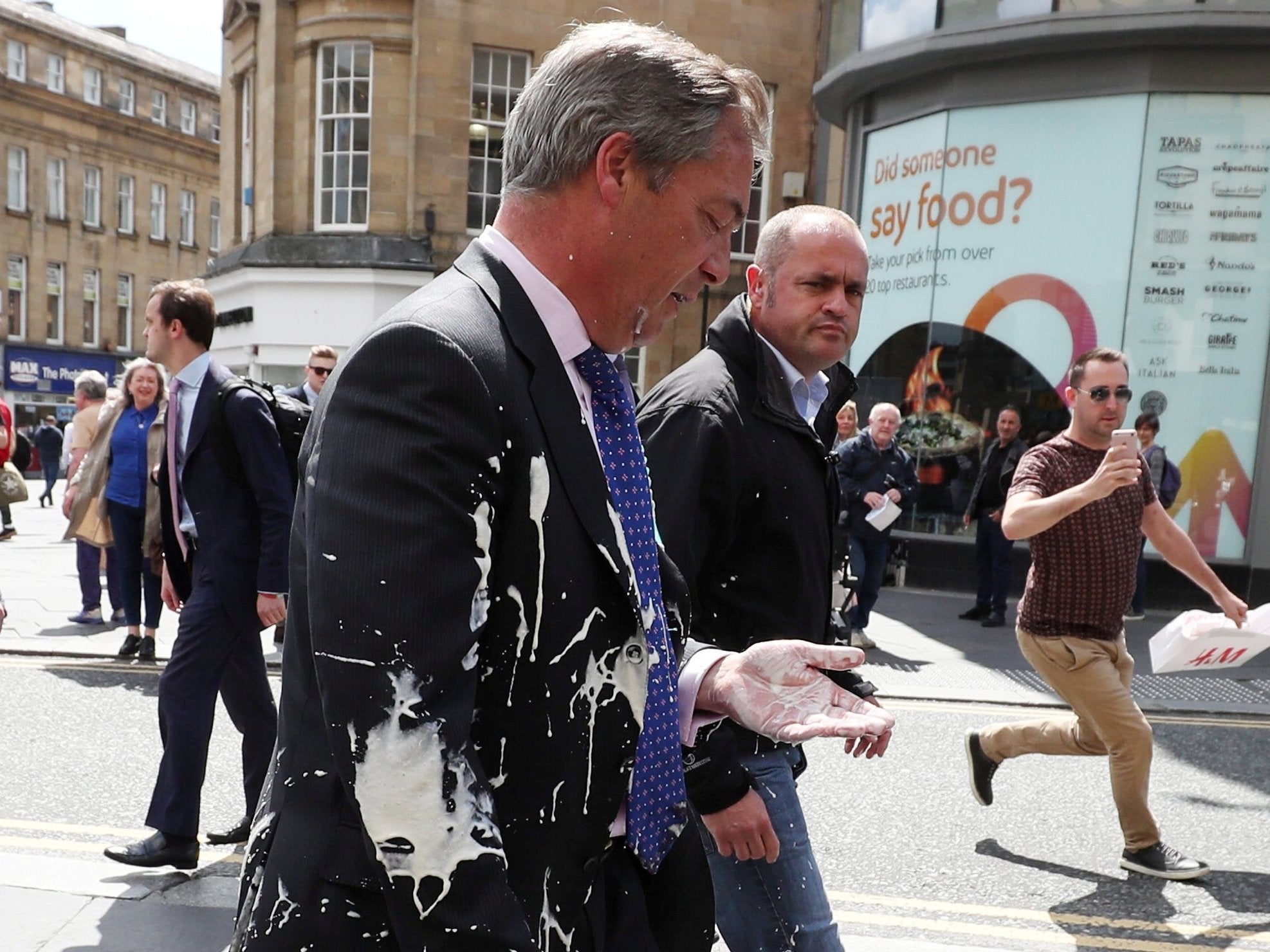
Again, there is a gall and a skill which is, in a technical sense, quite awesome. Getting milkshaked seems to have done him no harm, beyond the dry cleaning bills. He is, though, also dangerous. The “Breaking Point” anti-immigrant/asylum seeker poster was Farage at his rawest. It worked, though, as a lot of the “dog whistle” signals that emerge from him and his gangs often do. His resentment at the “mainstream media”, parliament and the Establishment often shading into what seems like violent contempt for representative democracy: “After 25 years of campaigning for Brexit, I believed we had won.
“Yet almost three years later, the government and MPs have betrayed Brexit … We must fight back against our failing MPs who have defied 17.4 million of us. Their two-party system cannot cope with Brexit. Politics is broken. Enough is enough.”
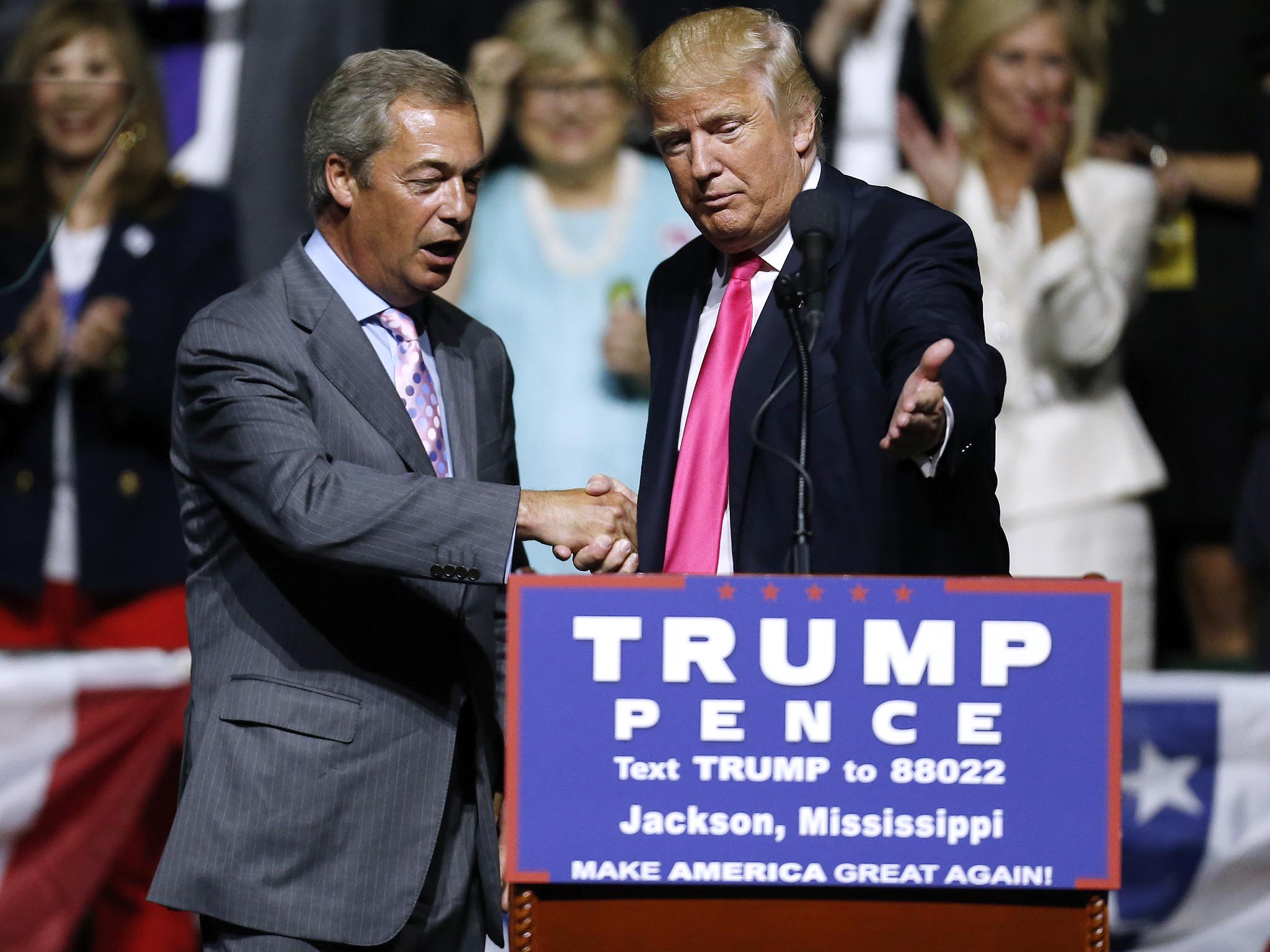
The language echoes Trump – “failing” – and parallels with The Donald are clear. Farage was, again, invited to meet the president during his state visit. There is a mutual admiration: “People in this country are seeing an American president who got elected making a series of promises and actually carrying them out. And the contrast between that and the two parties here who write things in manifestoes that they never intend to deliver, is also one of the reasons why Trump’s popularity is much higher now than it was back at the time he was elected.”
Farage sees himself as a populist, polarising but mainstream politician. Not all would agree. However, few could deny his impact on British politics. Arguably he has been the most important figure on the British scene over the past decade or so, for good or ill. Had he stood in Peterborough, perhaps he would be Nigel Farage MP today. There is no denying his high profile – a 95 per cent recognition rating and 26 per cent approval rating – and it could have seen him snatch victory. Or perhaps that very polarising effect would have repelled more voters. Peterborough might have been his eighth failed attempt to get into the Commons.
The man who has done more to get Britain out of Europe than anyone else, and changed the British constitution and party system for ever, is loved and loathed for it, and in unusual measure. He may be fairly said to be “beyond Marmite”. It isn’t a simple question of hate or love. His critics see him as “a pound shop Enoch Powell” (Russell Brand) or “an absolute t**t” (Sir Nicholas Soames); his disciples prefer to think of him as a successor to Churchill. Trump called him “brilliant”. The idea of Farage in No 10 may still be preposterous; but he and his party aren’t going away.
The Faragistes say they are “changing politics for good”. If only in one sense, it is an irrefutable claim. A decade ago Ukip was a fringe protest party, and the EU a source of the odd grumble, but way, way down the voters’ list of priorities, far behind the economy, the financial crisis, the NHS, schools, policing and so on. The Farage effect has been to end that relatively rational world, and to bring confusion, chaos and conflict to national political life. It is, in short, a political and cultural civil war, and it feels permanent.
Join our commenting forum
Join thought-provoking conversations, follow other Independent readers and see their replies
Comments